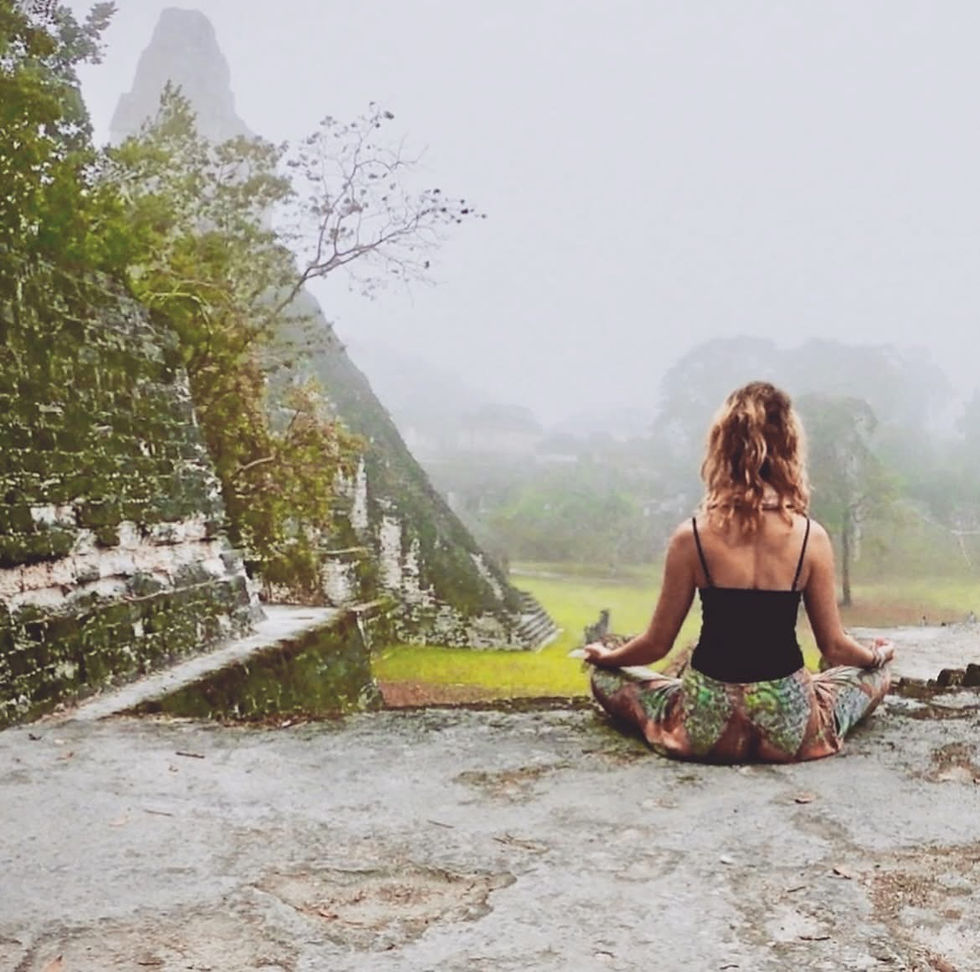RISE & THRIVE: Embracing Ancestral Wisdom in Oaxaca, Mexico
- Stephanie Kittell

- Sep 24, 2025
- 4 min read
Updated: Oct 9, 2025

I love learning from ancestral wisdom traditions around the world, especially in the vibrant lands of Oaxaca, Mexico. The seemingly simple yet profound act of ‘turning water into wine’—or in this case, working with an agave plant to ferment pulque or distill mezcal—provides a window into a world rich with context, character, and connection.
The Rise of Women in Oaxaca's Agave Traditions
As an added layer, I love witnessing women stepping into traditionally male-dominated roles, like that of a Pulquera or Mescalera. These women choose to RISE & THRIVE in Oaxaca's agave traditions against all odds. It reminds me that context is always changing and culture is never a fixed point.
Recently, I had the opportunity to join a Oaxaca Artisanal Mezcal Experience with WSE Travel. Their ethos, ‘Where Sidewalks End,’ takes willing explorers off the beaten path while creating a positive impact on the communities and environment. The relationships they bridge are real, something I felt immediately.
First up in the tour, I was fortunate to visit the organic farm and pulqueria of a woman who returned to her native Zapotec lands in Santiago Matatlan. She carries on the ancestral aguamiel and pulque traditions of her grandparents.
Reina (I LOVE that her name means ‘Queen’ in Spanish) welcomed us into her queendom. She introduced us to the very lifeblood that flows through the heart of the agave plant—a sweet sap called aguamiel (which translates to ‘honey water’).
The Labour of Love
It’s an act of devotion. Waiting 10-25 years for the agave to mature, Reina returns to the plant every day before dawn and after dusk to harvest the sap. She meticulously cleans the carved-out centre of the succulent plant so that the flow of sap continues to fill the cup with ease. You might say it’s a labor of love.
Of course, it’s always fascinating to see the old ways hold hands with the new. Where the liquid was once harvested with the long carved-out hull of a local squash, a Coca-Cola bottle and rubber tube now stand in its place.
This aguamiel can be enjoyed freshly harvested and consumed as is—a nutritional powerhouse of prebiotics, essential amino acids, vitamin C, minerals like potassium, and anti-inflammatory and antioxidant saponins and phenolic compounds.
When fermented for a few hours, it can be enjoyed as a probiotic-rich low-alcohol content pulque fresco, which has a very limited shelf life. Like all good things in nature, when it’s ready, it’s ready!
If you’re willing to wait for a longer ferment, you’ll enjoy a pulque viejo, which is much more effervescent and vinegary, with a higher alcohol content of 10% or more. Reina showed us the magic of her perfectly harmonious blend of pulque fresco and pulque viejo.
She also demonstrated her blends of pulque fresco with various local in-season fruits, like maracuyá and guayaba, as well as a creamy blend with local cacahuate (peanuts).
What I love about pulque is that it’s not something you can buy in stores. Its shelf-life is limited. Sub-par versions of the beverage with added preservatives take on a thick, viscous texture that is no longer appetizing.
To truly enjoy this hand-crafted ancestral beverage, you have to go to the source and connect with the people and plants who bring pulque into being—an art that dates back to pre-Hispanic times.

Our next stop on the journey in Santiago Matatlan was a female-owned and operated artisanal mezcaleria.
Unfortunately, women in the mezcal industry have to fight for respect in this male-dominated field. It’s an uphill battle, but mescalera Lydia and her family have taken up the challenge beautifully!
For me, anyone who alchemizes nature’s gifts into even more magical creations is, without a doubt, a curandera (healer). Maybe there’s a reason distilled alcohol is referred to as ‘spirits.’ There seems to be a presence in the process that brings us closer to the spirit of nature and our own spiritual being.
We are nature, after all. I felt this in Lydia’s artisanal mezcal. Spirit was alive and moving through each sip.
Mezcal (distilled alcohol made from the agave or maguey plant) is not a one-size-fits-all beverage. Like fine wine or whiskey, there are nuances that appeal to individual palates differently. Each artist crafts their unique flavors.
While an Espadin is smoother and more neutral in flavor, easier to cultivate, with a higher sugar content that gives a higher yield; Jabalí (which I discovered as my favorite) is more herbal and complex, harder to grow, with a much lower sugar content and yield.
Of course, there are countless other varieties I could wax poetic about. I appreciated the wisdom and care that came with each tasting, as if I were being invited behind the veil of a mysterious world.
Cleansing Rituals and Nourishment
Also, in the fields among the succulents, Lydia’s mother gave me a limpia, a ritual from Mesoamerican and Andean indigenous traditions. This ritual involves the use of aromatic plants and herbs to cleanse a person’s body-mind-spirit of unwanted energies and restore balance.
Each curandera (healer) does it differently, utilizing the medicinal plants and wisdom of their ancestral lands. In this case, the herbaceous branches of the pirul tree (used for purification and protection) swept me clean, while mezcal spray brought spirit home to the body.
To top it all off, we enjoyed a simply delicious home-cooked meal. We had traditional memelas (made vegan for me—without pork lard and cheese), corn tortillas with a spread of frijoles (fried beans), grilled nopales (cactus flesh), and a spicy homemade salsa. We were also treated to a sweet and sensuous cup of hot chocolate made from local cacao beans roasted and ground on site.
As they say in Mexico, “Que padre!” (How cool!).

I felt so deeply held and nourished through this whole exploration. What a privilege it is to step into a world where women are rising against the odds in traditionally male-dominated realms. Our connection to the Earth and her gifts remains strong, and ancestral traditions live on!
May it continue… for all of us!
Big love and gratitude to WSE Travel for this experience and for taking such great responsibility and care in doing tourism differently.
With a heart so full,
Stephanie
➡️ Check out WSE Travel for more Oaxaca, Mexico experiences: https://www.wheresidewalksend.com/
➡️ Follow Reina & her pulqueria, Avla Casa del Pulque: https://www.instagram.com/avlacasadelpulqueoficial/
➡️ Follow Lydia & her mezcaleria, Desde la Eternidad Artisanal Mezcal: https://www.instagram.com/mezcal_desde_la_eternidad/







































































Comments